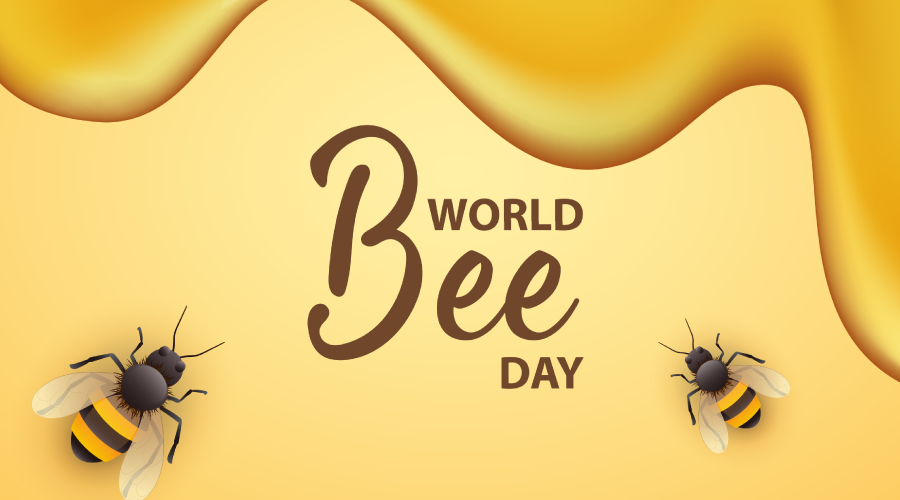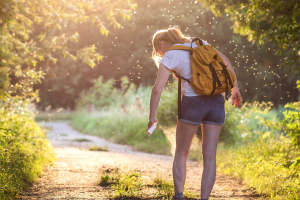

Bees are important for the planet’s health, its ecosystems, and the people who rely on those ecosystems. Honey and beeswax are highly therapeutic substances, and pollination, which is a bee’s full-time job, is essential for crop production. Bees pollinate about 170,000 plant types worldwide. Without bees and other pollinators, fruits and vegetables would be scarce. As one of the primary pollinators that ensure food supply, sustainable agriculture, and biodiversity, bees are important to life and the ecology of our world. Bees also play an important role in climate change mitigation and environmental conservation. This year, on May 20, people all around the world will celebrate World Bee Day to raise awareness about the importance of bee pollination. The day was announced by the United Nations to encourage people all over the world to take action to preserve and protect honeybees and other pollinators. Scroll down to learn about the importance of bees.
Why are Bees Important?
According to the Food and Agriculture Organisation (FAO), pollinators are required for 71 percent of all crop species produced for human use. Bees and other pollinators are responsible for one-third of all food produced on the planet.
Honeybees have been increasingly endangered over the previous 50 years, which is an issue. The IUCN and other scientific investigations have shown that the global bee population is rapidly diminishing. Honeybee extinction will not only deprive the world of yet another species but it will also have many implications for ecosystems and humanity. According to FAO data, bees and other pollinators are priceless when it comes to preserving the global safety of the food supply chain. Importance of honey bees lies in maintaining ecological balance and ensuring biodiversity conservation in nature, as well as serving as an environmental indicator.
Significance of World Bee Day
In the northern hemisphere, it is spring in May, when bees are most active and begin to reproduce and the need for pollination is greatest. It is fall in the southern hemisphere and it is the time to harvest honey and other bee products.
Slovenia, led by the Slovenian Beekeepers’ Association, advocated for World Bee Day at the United Nations. They chose May 20 as the birthday of Slovenian Anton Jana (1734–1773), the forefather of modern beekeeping.
Ways to Preserve Bees
Listed below are the different ways you can adopt in order to preserve bees:
1. Plant a Bee Garden
One of the most important threats to bees is a lack of a safe environment in which they may establish nests and receive a variety of nutritious food sources. You can build a habitat passage with plants that are high in pollen and nectar by planting a bee garden. Consider planting flowers that will bloom all season or at different times throughout the season if you’re a seasoned gardener. The bees will never go thirsty this way.
Gardens can be developed across yards and in window boxes, flowerpots, and planters, so you don’t need a lot of room to cultivate bee-friendly plants. You can also work with local governments and organisations to develop ways to improve public and shared areas.
2. Support Local Beekeepers
Local beekeepers work hard to care for their hives and the surrounding neighbourhood. Purchasing locally made honey and beeswax products are the simplest ways to express your gratitude. Raw honey is unheated, unpasteurized, and undiluted, so it’s high in antioxidants, vitamins and minerals.
Raw honey can be used for more than just eating. It’s a well-known treatment for minor burns and cuts and it can also help with colds and sore throats. Many beekeepers use honey from their hives to make beeswax candles, soaps, and moisturisers. You can also help local beekeeping societies and environmental organisations thrive by donating your time, resources, and money.
3. Avoid Neonicotinoids
Neonicotinoids are poisonous chemicals (Insecticides) that disrupt the neurological systems of bees, causing death and paralysis. Make sure the pollinator plants you buy from the nursery are free of neonicotinoids.
4. Don’t Use Pesticides
Bees are poisoned by synthetic pesticides, fertilisers, herbicides, and neonicotinoids, which damage their sensitive systems. Pesticides stay in floral nectar and pollen, where bees are most likely to come into touch with them. These poisons not only weaken bees but also make them more vulnerable and may contribute to decline in bee population.
Instead of using synthetic chemicals to treat your outdoor spaces and plants, consider using organic goods or natural remedies like compost to improve soil health and helpful insects like ladybugs to keep pests at bay.
5. Create a Bee Bath
Hunting, gathering, and collecting nectar cause bees to build up quite a thirst. Fill a shallow birdbath or bowl halfway with clean water, then scatter pebbles and stones within to break the surface of the water. Bees will perch on the stones and pebbles to drink deeply and thoroughly. Bees and other pollinators can rest on the rocks to cool off before exploring your new bee garden.
6. Buy Organic Honey
The present endangered state of bees is mostly due to synthetic fertilisers, pesticides, and other toxic substances. These toxins can weaken or kill the hive when bees feed on local plants. Insecticides are a major contributor to honeybee extinction. Buy organic honey to show your support for farming practices that avoid the use of these dangerous chemicals.
You will avoid subsidising industrial agriculture that employs synthetic chemicals and pesticides, destroying the land and killing pollinating insects, if you buy organic fruit and vegetables.
Conclusion
Bees and other pollinators are responsible for one-third of the world’s food. They are becoming increasingly endangered and nearly unable to survive without human assistance and help. Therefore, it seems only appropriate that the general people are aware about this issue and take the right measures in light of World Bee Day this year.
Frequently Asked Questions About World Bee Day
Q2. Who plays a key role in World Bee Day celebration?
The UN established May 20 as World Bee Day with the aim to raise awareness about the importance of bees.
Q3. Why does World Bee Day fall on 20 May?
20 May is the birth anniversary of Anton Janša, one of the greatest Slovenian beekeepers. He is recognised among the fathers of modern beekeeping.




